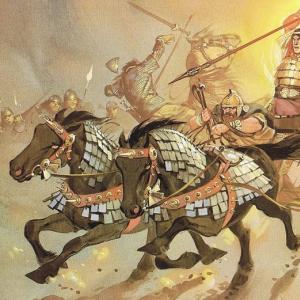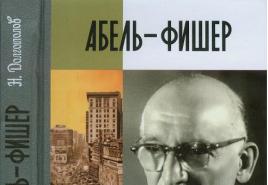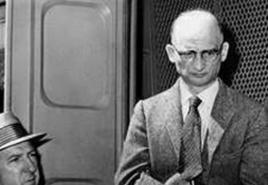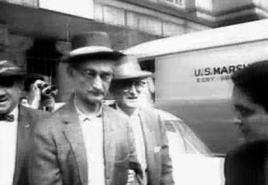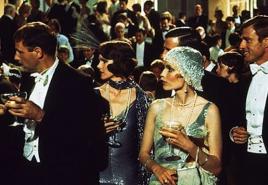Yakub Ganetsky (biography of a revolutionary). Big Biographical Encyclopedia Role in the Russian Revolution
In 1879, the future active revolutionary leader, supporter and associate of Dzerzhinsky, Ganetsky Yakub Stanislavovich, was born in the capital of Poland. On March 15th, this happy event took place in a Jewish family. Ganetsky's father was a wealthy bourgeois merchant. At the age of 17, the gymnasium student Ganetsky was expelled from school due to the fact that he was in an underground circle. As a student at the gymnasium in Petrków, Jakub joined the ranks of the Social Democracy of the Kingdom of Poland and Lithuania (SKDPiL).
After graduating from high school he went to Germany. In the fall of 1901, he began his studies at higher educational institutions the German and Swiss capitals and Heidelberg. At the beginning of 1902, Ganecki was arrested and exiled from Berlin. Three years later, he took part in revolutionary events in the capital of Poland. In 1907, Ganetsky joined the central committee of the RSDLP party.
For his activities, Ganetskiy was arrested and exiled many times. Of all his references, he managed to escape. He took part in organizing the release from prisons and even prison escapes of prominent figures of the Social Democratic Party. Like Lenin, Stalin and many other revolutionaries, our hero took on a pseudonym. His real name is Jacob Furstenberg.
Having become a member of the Foreign Collegium of the Central Committee of the SDKPiL, in the summer of 1912 Ganetsky took part in organizing Lenin's move from the capital of France to the territory of Austria-Hungary. Yakub Stanislavovich very quickly became an ally and assistant to the leader of the world revolution.
During the First World War, Ganetsky became a participant in negotiations with the General Staff of the German Army on financing the Bolsheviks.
After the revolution, he was appointed head of the People's Bank of the Soviet state. Organized the repatriation of Lenin from emigration to his homeland. After the events of 1917, Ganetsky became a member of the foreign bureau of the central committee of the RSDLP. The next year he took part in the Brest-Litovsk negotiations, and in 1920 he became a member of the delegation at the negotiations with Poland on the conclusion of peace following the military conflict. From 1920 to 1922, Yakub Stanislavovich worked as the trade representative of the Soviet state in Latvia. For 7 years since 1923, he was a member of the board of the People's Commissariat of Foreign Trade Soviet Union... In 1935, Ganetsky was appointed head of the State Association for Music and Variety. From 04/25/1935 until his arrest in his own apartment on 07/18/1937, Yakub Stanislavovich served as director of the capital's Museum of the Revolution. Ganetsky was declared a German spy. On November 26 of the same year, Ganetsky was shot. His family was also subjected to repression. Spouse Giza was shot on December 10, 1937. Son Stanislav was shot on 14/09/1938, and daughter Hannah spent 18 years in the camps, but survived.
Russia
RSFSR
the USSR
Jakub Ganetsky (real name Yakov Stanislavovich Furstenberg, party aliases: Henry, Cuba, Mikola, Driver; March 15, Warsaw - November 26) - Polish and Russian revolutionary, Soviet statesman.
Participation in the social democratic movement
Born in 1879 in Warsaw into the family of a wealthy merchant and industrialist (a Polonized Jewish family). According to the book by N. Berberova<<Железная женщина>\u003e, the family was related to A. Parvus. As a high school student, he was a member of an illegal student circle in Warsaw, expelled from the 6th grade. From 1896 academic. in the gymnasium in Petrkuv, he got acquainted with Marxist literature, conducted social-democratic propaganda among workers and students. In the city he joined the Social Democracy of the Kingdom of Poland and Lithuania (SDKPiL). After graduating from high school, in 1900-01 he served as a volunteer in the infantry. regiment in Petrków. In 1901 he left for Germany. From autumn 1901 he studied at the Berlin, Heidelberg and Zurich universities. Since 1901, a member of the SDKPL. One of the organizers and member of the Main Board of Social Democracy of the Kingdom of Poland and Lithuania, F. Dzerzhinsky's closest associate, together with him participated in the work of the 2nd congress of the RSDLP from Polish Marxists, then a participant in the 4th, 5th and other congresses of the RSDLP. In February 1902 he was arrested in Berlin for receiving transport of revolutionary literature from Paris and exiled from Prussia. In 1903-1909. was one of the leaders of SDKPL. Participant of the revolution in Warsaw, with a member of the Central Committee of the RSDLP. He was a member of the Russian Bureau of the Central Committee of the RSDLP in 1908-1910.
He was repeatedly arrested and exiled. I ran from links. Organized the release from prisons (including escapes) of prominent Social Democrats. He was a member of the Foreign Collegium of the Central Committee of SDKPiL.
Role in the Russian revolution
In the summer of 1912, he organized Lenin's move from France (Lenin lived in Paris) to Austria-Hungary, where Lenin settled in Krakow, and became his closest confidant and assistant. There are suspicions that it was through Ganetsky that Lenin began to establish ties with the military and political authorities of Austria-Hungary, wishing to put their hatred of Russia at the service of the goals of the socialist revolution in Ingushetia. On the eve of the First World War, since March, Ganetsky lived with Lenin in the town of Poronin on the Russian-Austrian border, and when, after the outbreak of the First World War, the local gendarme arrested Lenin as a subject tsarist Russia on suspicion of espionage, then as an active member of the Krakow Union of Assistance to Political Prisoners, Ganecki helped to release him from prison in Nowy Targa and move him to Switzerland, with the help of the prominent Austrian Social Democrat Viktor Adler, explaining to police and military officials of Austria-Hungary that Lenin was bitter enemy of the tsarist government and an active organizer of strikes in Russia.
In the same year, he became the executive director of the export-import company Fabian Klingsland created by Parvus, and the co-owner of the company was Ganetsky's elder brother, Henrikh Ganetsky, and its representative in St. Petersburg was Ganetsky’s cousin Evgenia Mavrikievna Sumenson.
Having settled in Copenhagen in June 1915, in August 1915 he became an employee of the Institute for the Study of the Social Consequences of War, Copenhagen: in Danish - Institut til Forskning af Krigens, created by Parvus in Denmark sociale Følger) located on Østerbrogade in the district of Osterbro. He maintains close ties with other employees of this Institute - Ekaterina Groman, Vladimir Perazich, Georgy Chudnovsky, Arshak Zurabov, Moisey Uritsky.
At the same time, Parvus makes Ganetsky director of the Trade and Export Company he created ( official name according to the commercial register in Danish - Handels- og Eksportkompagniet AIS, in English - Trading and Export Company). The company, which Parvus founded in Copenhagen, had its own network of agents that ply between Scandinavia and Russia. From the beginning of the war, the company supplied Russia with goods that were in dire need during the war years from neutral Denmark, sold them there, and immediately sent all the proceeds to financing revolutionary organizations in Russia, printing clandestine leaflets and proclamations. In addition to trading, these agents liaised with various underground organizations and strike committees, trying to coordinate their actions and turn scattered actions into a single movement. Through the catalogs of the offered goods, Parvus's agents transmitted secret information written in invisible ink, including the instructions of Lenin from Zurich.
In Copenhagen, Ganecki lives in an expensive villa at Martinsvej, 9 B, next to Parvus's own villa, which was located at Vodroffsvej 50 B.
In January 1917, he was arrested by the Danish police on suspicion of illegal military smuggling and expelled from the country. He was forced to urgently move to neighboring Sweden and settled in Stockholm. On March 31, during Lenin's passage through Stockholm, he was appointed by him as a member of the Foreign Bureau of the Central Committee (along with Vorovsky and Radek) and thus, together with Radek and Vorovsky, he was left by Lenin in Stockholm under the guise of the Foreign Bureau of the Central Committee for the uninterrupted supply of funds from Parvus to strengthening Bolshevik organizations and the press in Russia, as well as for conducting Bolshevik propaganda to the West.
From Stockholm itself on May 1, 1917, together with Radek and his wife Rosa, he moved to the fashionable suburban area of \u200b\u200bNeglinge and settled in the same house with the Radeks. Ganetsky's telegraphic address in Sweden, to which Lenin and other leaders of the Bolshevik Party sent him telegrams from Petrograd, were: Saltsjobaden, Neglinge bei Stockholm.
In July 1917, Yakub's cousin and his business representative in Petrograd, Yevgenia Mavrikievna Sumenson, was arrested on suspicion of transferring German money to the Bolsheviks. in Russia Yuri Izrailevich Fridland. In October 1917 she was released on bail. The further fate of Sumenson, a relative of Ganetsky, is unknown, it is not known when she died and where she was buried. According to some reports, in New York, where she moved and settled among jewish community New York.
A week after the victory October revolution Ganetsky came to Russia and was appointed Deputy People's Commissar of Finance and Governor of the People's Bank of the RSFSR. He was a member of the Soviet delegation at the negotiations in Brest-Litovsk in 1918.
During the war with Poland, he participated in peace negotiations with Poland, later was a member of the board of the Tsentrosoyuz and a member of the collegiums of the People's Commissariat of Finance, Vneshtorg and the USSR People's Commissariat for Foreign Affairs (F. Dzerzhinsky was sent there to establish trade with other countries, where he had great connections in circles social democratic parliamentarians).
In 1920-1922. - Trade Representative of the RSFSR in Latvia. B signed the Treaty of Kars on behalf of the RSFSR on October 13, 1921 in the city of Kars. In 1923-1930. - One of the leaders and member of the board of the USSR People's Commissariat for Foreign Trade. In 1930-1935. was a member of the Presidium of the Supreme Economic Council of the RSFSR. In 1932-1935. as head of the State Association of Music, Variety and Circus. 1935-1936 - Head of the Department of Circus and Parks of Culture and Rest of the Mosconcert. According to a number of literary scholars, his personality in this position served as a prototype for a character named Rimsky, derived in Mikhail Bulgakov's novel The Master and Margarita. From April 25, he was director of the Museum of the Revolution in Moscow. On July 18, 1937, he was arrested by the NKVD in his apartment in the Government House on the embankment (2 Serafimovich St.) and was shot on November 26, 1937. In 1954 he was posthumously rehabilitated.
Marriage and family
He was married to Ganetskaya Giza (Gitley) Adolfovna (1889-1937). She was arrested two days after the arrest of Yakub, on July 20, 1937. She was sentenced and shot on December 10, 1937, 2 weeks after her husband was shot.
Their son, Stanislav Yakovlevich Ganetsky (1913-1938), a 4th year student of the Red Army Air Force Academy, was arrested on December 14, 1937. Sentenced and shot on June 14, 1938.
In 1954 they were posthumously rehabilitated.
Daughter - Ganetskaya Khana (Khanka) Yakovlevna was also repressed, sentenced to 10 years in prison, spent in the camps for a total of 18 years, but managed to survive and after rehabilitation in 1956 she returned to Moscow.
Bibliography
- Ganetsky Ya. "Memories of Lenin" - M., 1933.
- Idashkin Y. "The secret of the hut in Razliv" - Yekaterinburg: " Stone Belt", 1992.
- A. Arutyunov "Lenin's Dossier without retouching" - M .: "Veche", 1999.656 with ISBN 5-7838-0530-0
- "Vladimir Ilyich Lenin: Biographical Chronicle", vol. 4, p. 31, 35.
- Haxthausen, Tørk - Titel: Dr. Helphand. Rejsende i revolution. Forlag: Gyldendal - Udgivet år: 1986 - Antal sider: 507
Links
- Fatekh Vergasov The Ganetsky Case: Who Financed Lenin?
- Yakov Stanislavovich Ganetsky (real name - Furstenberg) Acting Chief Commissioner of the People's Bank of the RSFSR in November 1918 - January 1920
| Heads of the Central (State) Bank of Russia and the USSR | ||
|---|---|---|
| Managers State bank Russian Empire (1860-1917) |
Stieglitz Lamansky Tsimsen Zhukovsky Pleske Timashev Konshin Shipov |  |
| Chief Commissioners People's Bank of the RSFSR (1917-1920) |
Pestkovsky Obolensky Pyatakov Spunde (acting) Popov Pyatakov Ganetsky (and about) | |
| Board Chairmen State bank USSR (1921-1991) |
||
Yakov (Yakub) Ganetsky (real name: Yakov Stanislavovich Furstenberg; born March 15, 1879 in Warsaw; executed on November 26, 1937) - Polish and Russian revolutionary, leader of the Soviet state.
Yakov Stanislavovich came from the family of a wealthy Polish industrialist of Jewish origin. Even in the 6th grade, he was expelled from the gymnasium for participating in the Warsaw illegal student circle, and in 1896 he entered the gymnasium in the city of Petrków and in the same year became a member of SDKPL (Social Democracy of the Kingdom of Poland and Lithuania).
In 1901, Fürstenberg left for Germany and then Switzerland and studied at the universities of Berlin, Heidelberg and Zurich. Being a close associate of Felix Edmundovich Dzerzhinsky, he became one of the organizers of the SDKPil and a member of its Main Board. In the winter of 1902, he was arrested and exiled from Prussia for receiving a batch of revolutionary literature from Paris. Jakub Ganecki took part in the 1905 revolution in Warsaw and was one of its leaders. In 1907 he became a member of the Central Committee of the RSDLP. Until 1910, Fürstenberg was arrested several times and sentenced to exile. During this period, he was engaged in the release of imprisoned revolutionaries or organizing their escape.
In the 1910s, Yakov Stanislavovich became close to the leader of the Russian revolutionary movement, Lenin, who instructed him, as a confidant, to establish contacts with the Austro-Hungarian political and military authorities in order to use their hostility to Russian Empire in the interests of realizing the socialist revolution in Russia.
In 1914, Ganetsky secured the release of Lenin from a Polish prison in Novy Targa, where he was imprisoned on suspicion of espionage in favor of Tsarist Russia, and helped him move to Switzerland. During the First World War, Jacob Furstenberg was a colleague of Alexander Gelfand (pseudonym: Parvus) and the executive director of the Fabian Klingsland company he founded, which was engaged in export-import operations in Denmark and Sweden and, through German payments, played a key role in financing revolutionary activities aimed at overthrow of the autocracy.
After the victory of the Great October Socialist Revolution of 1917, Vladimir Ilyich Lenin invited Ganetsky to Russia and appointed him Deputy Commissar of Finance and Governor of the People's Bank of the RSFSR. In 1918, Yakov Stanislavovich was one of the participants in the negotiations in Brest-Litovsk. In the period from 1923 to 1930, Furstenberg served as one of the leaders of the People's Commissariat for Foreign Trade of the USSR, and from 1930 to 1935 he was a member of the Presidium of the Supreme Council of the National Economy of the RSFSR. From 1932 to 1936, he held various posts: he was the head of the State Association of Music, Variety and Circus, the Office of Circus and Parks of Culture and Leisure, director of the Moscow Museum of the Revolution.
Ganetsky Ya.S.
(J. Firstenberg, 1879-1937; autobiography). - I was born on May 15, 1879 in Warsaw. I come from a bourgeois, fairly well-to-do family. Even in my youth, my father dreamed of giving me a "good" upbringing, a lot of knowledge, so that I would become a "famous lawyer", "major engineer" or something like that ... However, since childhood I seem to charted a different path for himself. Even then, there was some kind of revolt in me. I was irritated by the position of the servants, the small - in my opinion - remuneration of the teacher, etc. The gymnasium, with its police regime, Russification tendencies, with the most disgusting pedagogical methods - only strengthened this rebellious spirit in me ... In the 4th grade, almost every day I had scandals with teachers or with the notorious "class teachers' assistants." Rarely did a day pass without a punishment cell, and if several "offenses" were going to happen at once, the punishment cell was postponed for Sundays. The persecution against me intensified after one "political" scandal. The "republican" headmaster of the gymnasium invited the students to come to the gymnasium on regular days. The choir sang, the orchestra played "God Save the Tsar", after which the students had to shout "Hurray". Two or three holidays went well, and the next - all the students opened their mouths - but deathly silence reigned ... The director established that I was one of the instigators. For this I got a triple in behavior until the end of the year, with the entry in the conduit magazine: "during the choral singing, God Save the Tsar," I laughed and persuaded the younger students not to shout "hurray" ... "
I finally considered myself a "revolutionary" then. I belonged to a secret student circle (they existed in all gymnasiums in Poland), which, however, satisfied me less and less, owing to the chauvinism reigning there. In the summer, I went with my family abroad to the seaside. There he devoured revolutionary literature and on the way back, secretly in front of his own people, took it with him. I had her around her body bandaged with bandages. When I was in the 5th grade, in 1896 I decided to leave Warsaw - and the gymnasium became unbearable and my family was embarrassed. I moved to Petrokov. Here lessons in the gymnasium receded into the background. Sometimes I did not go to school for whole weeks due to illness. We managed to find three more such "diligent" students. During the day, in our circle we were seriously engaged in political economy, we read Kautsky, and in a year went through almost the entire first volume of Marx's Capital (although much in it remained incomprehensible). In the evenings we gave lectures to local workers, among whom we organized several circles; through them, illegal literature, proclamations, etc. were distributed. There was also a connection with the workers in the neighborhood, where we traveled very secretly, changing into civilian clothes (then there was a special uniform in the gymnasiums, soldier type), and spoke at meetings at 40-50 man. In 1899, when I was already in the 8th grade, due to the arrests of some comrades in Warsaw, I was threatened with failure; the gendarmes were already entering the apartment and began to ask intensely about my life. This story for me ended doubly well. The gendarmes calmed down. But my father got worried and, wanting to knock all the "nonsense" out of my head, supplied me with a large amount of money and sent me on Christmas holidays to have fun abroad. The method is very clever and almost correct. But the poor thing was very upset when he later found out that in Berlin, Leipzig, Paris, I had a peculiar amusement, zealously attending socialist meetings. At one time I was strongly influenced by Tolstoy, his "Kreutzer Sonata". He took an active part in organizing Tolstoy's circles among the students, even managed to convene one congress. But this did not last long - and pure Marxism pulled me entirely.
In the same year, after graduating from high school, I entered the volunteer military service in Petrokov. Here I was threatened with a case in a military court for scolding the regiment commander. But the doctor saved me, who made sure that I was in an "agitated state", and the case ended with a week's arrest and a 2-week "treatment" in a military hospital. After finishing my military service a year later, I went abroad, where I spent two semesters in Berlin and one each in Heidelberg and Zurich. He was engaged in natural and social sciences, but more and more in party work, being a link between Poland and abroad. At the beginning of 1902, I was arrested in Berlin and administratively expelled from Prussia: the post informed the police that I had received a transport of socialist literature from Paris (the literature had been re-sent to Poland). Staying in Zurich, too remote from Poland, weighed down on me. He was drawn to his homeland for party work ... In the summer of 1902, Dzerzhinsky fled from exile. We immediately organized a party (Polish Social-Democratic) conference in Berlin, which laid the finally firm foundations for our party. After the conference, I illegally went to Poland to work. I had to hide not only in front of the secret police, but also from my parents, in order to save them from worries, and myself from family dramas ... My parents were sure that I was traveling around the beautiful Swiss lakes, from where they systematically received letters from me, written in advance and left to comrades for sending.
Since that time, I have become finally a professional party member. I take part in all the party congresses of the Polish Social Democracy, at the 4th - in 1903, at the 5th - in 1906, at the 6th - in 1908, and since 1903 I have been a permanent member of the main party reign. On behalf of the Polish party I participate in 1903 at the 2nd Congress of the RSDLP, where I first met Lenin, and in 1906 at the Stockholm (uniting), where our party joined the RSDLP. At the London Congress in 1907, I was elected to the Central Committee of the RSDLP. Until 1911, I took part in meetings of the Central Committee in Russia, as well as in party conferences. The first time he was arrested in 1903, on December 20th. He was arrested by accident at a safe house in Warsaw with a forged passport in the name of "Trotsky". After various ordeals, an 8-day hunger strike, and most importantly, thanks to "new trends", I was released on bail in September 1904. The case brought against me was once adjourned due to the absence of other accused, and then on the basis of a general amnesty it was completely terminated. He was arrested for the second time in October 1906 with a forged passport in the name of "Borel" while organizing the escape of one comrade from the Wloclaw prison. In view of the martial law, on the same night a field trial was arranged over me, but it ended safely, however. From prison in March 1907 he was administratively exiled to the Vyatka province, from where he fled in April. On the way through Peter I stopped by Lenin's in Finland, where they mainly discussed issues related to the upcoming London Congress. On the day of my arrival in Warsaw, I was arrested at a party apartment and on November 11, due to illness, I was administratively exiled pending trial to the Orenburg province, from where I soon fled. After the split in the Polish Social Democratic Party. I am a member of the regional administration of the breakaway part of the party, which was closer to the Bolsheviks and was in close contact with their foreign center headed by Lenin. In 1912 I take part in the international Basel Congress, and in 1914, on the eve of the war, at a conference at the International. Bureau (an attempt by the International Bureau to unite the Bolsheviks with the Mensheviks). The war caught me in Krakow. At the end of 1915, I got out of there, stayed in Switzerland for several months and in the summer of 1916 moved to Scandinavia. On the manifesto of the Zimmerwald Conference there is my signature, at the conference itself, due to passport difficulties, I was not present. In 1917, after the February revolution, when Lenin arrived in Petrograd, the Foreign Bureau Center was organized in Stockholm. committee, where I belong together with Vorovsky and Radek. After the October Revolution, I moved to Russia, where I stay at Soviet work all the time. In the beginning I work in the People's Commissariat for Finance as Comrade. main Commissioner of the People's Bank, and then I was appointed chief. Commissioner-manager of the bank and a member of the board of the Narkomfin. In 1918, I took part in the negotiations in Berlin on an additional agreement with the imperial Germany. In the same year, in Berlin, together with Vorovsky, I negotiate with Finland. In 1920, I am a member of the delegation for negotiations with Latvia, and upon completion I am appointed Plenipotentiary Representative and Trade Representative in Latvia. In 1921 I took part in a delegation for peace negotiations with Poland and in the same year I went as a representative of the RSFSR to the Kars conference (negotiations between the Transcaucasian republics and Turkey). I remain in the post of representative in Latvia until the end of 1921, when I move to work at the People's Commissariat for Foreign Affairs as a member of the board. In 1923 I went to work at the People's Commissariat for Foreign Trade, where I still work as a member of the board. Now I am the chairman. delegation for negotiations with Germany on a trade agreement (September 1, 1925).
[In 1930-32, a member of the Presidium of the Supreme Economic Council of the RSFSR. In 1932-35 he headed the State Association of Music, Stage and Circus. Since 1935 director of the Museum of the Revolution of the USSR. Unreasonably repressed, rehabilitated
Watch value Ganetsky, Yakov Stanislavovich in other dictionaries
Abramsky Yakov Khatskelevich - (1913, Moscow -?). Member of the Zionist Socialist Youth Organization. In 1932, in exile in the village of Suzak (Chimkent region), then in Tashkent. In April 1933 - April 1934 was in ........
Political Dictionary
Alekhin Yakov Ivanovich - (c. 1888 -?). Socialist-revolutionary. Member of the AKP since 1912. Higher education. At the end of 1921 he lived in Voronezh province, worked as an agronomist. Local chekists were characterized as "Chernivtsi", ........
Political Dictionary
Aluker Yakov Yakovlevich - (? -?). Member of the Ceirei Zion party. Arrested on 4.5.1922 at the party congress in Kiev. The further fate is unknown.
Research and development center "Memorial".
Political Dictionary
Scarlet [real Surname - Sukhovolsky] Yakov - (1880s - 1920). Anarchist. Working. Member of the Revolution of 1905-07. In 1917 he was released from hard labor. In 1917-18 the leader of the Elizavetgrad group of anarcho-syndicalists. In November 1918 he took part ........
Political Dictionary
Amorai Jacob - (1893, Kharkov -?). Member of "He-Halutz" and the party "Hitahadut". In 1925 he was exiled to Palestine. The further fate is unknown.
S.Ch.
Political Dictionary
Arava [arav] Yakov Solomonovich (had documents in the name of Foma Lvovich) - (1904, Kherson -?). Member of the Zionist Socialist Party and the Podolsk Bureau of He-Haluta. 04/27/1926 arrested in Vinnitsa, placed in the Vinnitsa house of preliminary detention ........
Political Dictionary
Aravin Yakov Alekseevich - (1891 -?). Social Democrat. Arrested on 2/25/1921 in Moscow in the Vperyod club, sent to Butyrka prison. In April 1921 he was transferred to the Vladimir prison. 11/17/1921 (according to other sources ........
Political Dictionary
Balaban Yakov - (about 1900 or 1905 - not earlier than 1937). Social Democrat. Member of the Union of Social Democratic Working Youth. In 1924-27 he served a term of imprisonment in a political isolator. In 1927-30 in exile in Tashkent .........
Political Dictionary
Bardachev Yakov Dmitrievich - (c. 1890 -?). Socialist-revolutionary. Of the peasants. Member of the AKP since 1917. Secondary education. At the end of 1921 he lived in the Saratov province. Local security officers were characterized as a "center", ........
Political Dictionary
Beigelman [beelman] Yakov Grigorievich - (? -?). Zionist Socialist. Arrested in Moscow. In June 1933 he was in Karaganda, in January - July 1934 in Irkutsk, unsuccessfully petitioned to replace the exile by deportation to Palestine .........
Political Dictionary
Berkal Yakov E. - (?, Minsk -?). Zionist Socialist. Was in exile in Baku. In September 1932 in exile in Achinsk, in November 1932 - March 1933 in the village. Ilyino (Narym). The further fate is unknown.
Research and development center "Memorial".
Political Dictionary
Berman Yakov - (? -?). Anarchist. Arrested by the Cheka in Moscow in April 1918, accused of participating in the expropriation of Soviet institutions. Subject to the court of the Revolutionary Tribunal, released on the promise to appear ........
Political Dictionary
Bernshtein Yakov Moiseevich - (5.7.1899 - 1.2.1938). Social Democrat. One of the organizers of the Kharkov Union of Social Democratic Working Youth. Arrested in 1922, exiled to Turkestan, soon escaped from ........
Political Dictionary
Bobkov Yakov Kalistratovich - (c. 1890 -?). Member of the PLCR since 1918. From the peasants. Graduated from a vocational school. At the end of 1921 he lived in the Ufa province and worked as a teacher. The further fate is unknown.
M. L.
Political Dictionary
Broido Mark Isaevich (Mordukh Mendelevich) (part.Pseudonyms: Yakov, M. Bragin) - (4.10.1877, Vilna province - 1937, London). Social Democrat. Member of the RSDLP since 1897, in 1917 social-democratic internationalist. Member of the Union of Metalworkers. Until 1917 he was imprisoned six times. One of the participants ........
Political Dictionary
Bromberg Yakov Fayvelevich (Party Nicknames - Yashura, Shura) - (1901, Kherson - 11.1995, Tel Aviv, Israel). Member of the Histadrut party. In 1923 he left for Palestine. He worked in Histadrut, was the chairman of the Jerusalem Council of Trade Unions.
S.Ch.
Political Dictionary
Budnik Yakov Kalmanovich - (?, Gomel -?). Socialist Zionist (?). Arrested in Gomel in September 1924 and 11/21/1924 sentenced to 3 years of exile. Served his sentence in Minusinsk. At the end of the link I received a "minus ........
Political Dictionary
Bukshtein Yakov - (? -?). Zionist socialist, member of the Moscow organization. In 1929 he lived in Tel Aviv (Palestine). The further fate is unknown.
S.Ch.
Political Dictionary
Walenstein Yakov - (? -?). Member of the National Labor (right-wing) "He-Halutz" and the "Hitakhadut" party. In 1924 he was arrested in Odessa on the Simkhat Torah holiday. Released soon. Later he left for Palestine .........
Political Dictionary
Vigraizer Yakov (Yankel) -usher Gershevich - (? -?). Member of the National-class (left) "He-Halutz". Arrested in the Tel Hai commune on 10/30/1926. In 1927 - October 1928 in exile in Ashgabat. In March 1929 he arrived in Palestine. Further ........
Political Dictionary
Vinokur Yakov - (1910-?). Zionist Socialist. Arrested at the Soviet-Persian border and sent back to the USSR by the Persian authorities. In April 1930 he was in exile. The further fate is unknown.
Voschikov Yakov Timofeevich - (c. 1894 -?). Social Democrat. Working. Lower education. Member of the RSDLP since 1918. At the end of 1921 he lived in the Ufa province. Local chekists were characterized as an "inactive" party ........
Political Dictionary
Gabelev Yakov Abramovich - (? -?). Zionist Socialist. In October 1935 he was imprisoned. The further fate is unknown.
M.K.
Political Dictionary
Glagzon Yakov (nickname - Yasha) - (? - 1919, Moscow). Anarchist. Working. In 1918 he was a member of the Federation of Anarchist Groups in Moscow. At the end of April 1919, together with P.A.Arshinov, he arrived in Gulyai-Pole and joined the Makhnovists .........
Political Dictionary
Gleich Yakov Itskovich - (?, Smotrich Kamenetsky u. Podolsk province. -?). Member of the United All-Russian Organization of Zionist Youth and the People's Labor (right) "He-Halutz". Arrested in 1926. In April ........
Political Dictionary
Gogan Yakov - (? -?). Member of "He-Halutz". In the 1930s. in exile in Tashkent, worked as a carpenter. Arrested in 1937 or 1938. His further fate is unknown.
M.K.
Political Dictionary
Gorevoy Yakov Natanovich - (? -?). Member of the National-class (left) "He-Halutz". Arrested in Rechitsa on 5.2.1925. Released after a week. In 1932, in exile in Obdorsk, in November 1932 - June 1933 in the village. Yusovo (Komi-Permyatsky ........
Political Dictionary
Gryazov Yakov Kuzmich - (? -?). Member of PLCR. At the end of 1921 he lived in the Tula province. The local chekists described him as an "underground" and "active" party worker. The further fate is unknown.
M. L.
Political Dictionary
Dvoeglazov Yakov Egorovich - (? -?). Member of PLCR. Was a delegate to the 3rd Extraordinary Congress. At the end of 1921 he lived in the Chigirinskaya volost, Vyatka province. The further fate is unknown. M. L.
Political Dictionary
Imshenetsky Yakov Kondratyevich - (1858 -?) Born into a priest's family. He graduated from seminary, studied at Moscow (expelled in 1881 for participating in the unrest of students) and Kiev universities, graduated from Novorossiysk ........
Political Dictionary



